Prepare for warp speed in aid of the nation’s defence
The Albanese Government must move fast, by March at latest, on fundamental defence change. Stephen Smith and Angus Houston have three key tasks in their strategic review - and they must be ruthless.
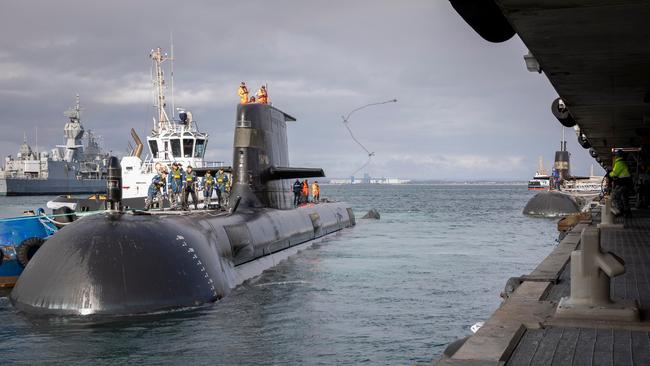
If Kevin Rudd’s pink batts were worth an inquiry, so are robo-debt and the mushrooming ministries.
But that’s all a sideshow. That’s politics as a sporting contest. That’s game theory. The nation has urgent needs that the government must fill. The economy will get most attention. But it’s national security that counts most.
Fellas, sideshow time is over. Business time now. To be fair, Anthony Albanese and his Defence Minister, Richard Marles, so far show every sign of understanding just how urgent the production of relevant defence capabilities really is. Nine years of Coalition government produced almost nothing beyond the continuation of programs already in place and a few obvious next steps, such as offshore patrol vessels. But the capabilities were, to use the technical term, pathetically inadequate.
Albanese and Marles have said the right things. Now they must deliver. The strategic review being conducted by former defence minister Stephen Smith and former chief of the defence force Angus Houston is, by government standards, ambitious in its timing. By Defence standards, it’s warp speed.
They aim to produce a big-picture interim report by November 1 and the final report for Marles by February 1. Marles wants to announce the big decisions on the nuclear-powered submarines to be acquired under the auspices of the AUKUS agreement, as well as whatever recommendations Smith and Houston make, by the end of March.
In Defence terms, this is ambitious timing. But it’s actually as late as the Albanese government should possibly go. At the end of March, the government will be more than 10 months through our hyper-short three-year governing term.
If it does its job properly, the Smith-Houston review is one of the most important in our national history. Just this week, a university report, originally commissioned by the Defence Department, showed that military conflict in the South China Sea would impact 90 per cent of Australia’s refined oil imports. We only ever have a few weeks’ fuel supply in store. The previous government was shockingly negligent on this.
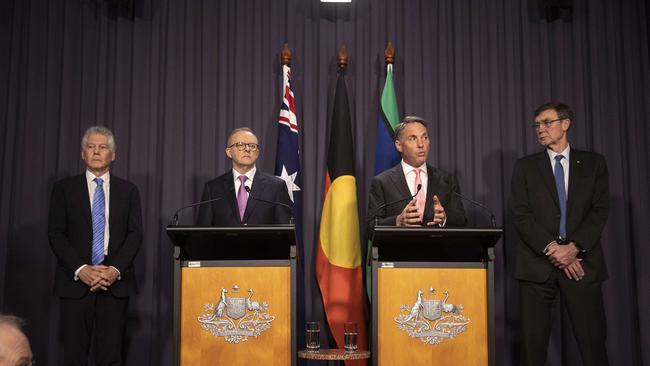
If war were to break out we would be effectively starved into submission within days. It’s true, as the previous government sometimes asserted, that we could never store enough fuel to withstand indefinite blockade. But if we had three months’ reserve, or preferably more, we could rely on our friends helping to relieve us in time.
But if, as is likely in war, there were several conflicts simultaneously in different parts of the world we might have to fend for ourselves for a time. Six years of ineffective Labor government, followed by nine years of ineffective Coalition government, have left us manifestly, gravely incapable of doing this.
We have two oil refineries left in Australia. Half a decade ago we had seven. Labor in opposition promised to address fuel security. We also have almost no merchant fleet, so that in an emergency an Australian government would not have vessels it could commandeer for basic national survival tasks. Labor in opposition promised to address this, too.
That we have not remedied these problems over years and years of lotus-eating plenty, when in security terms we were fat and happy and lazy, above all lazy, is a tremendous failure of our nation.
Fuel security and the provision of a merchant fleet are well beyond the remit of the Smith-Houston review. But as Houston said when the review was announced, the strategic circumstances of today are the worst he has seen in his professional experience, or indeed in his entire life, and he’s a man in his mid-70s. No one disagrees with Houston’s bleak and alarming assessment. The security threat comes from the People’s Republic of China and may play out for Australia as war over Taiwan, or in a thousand other contingencies. The bit of the puzzle Smith and Houston must deal with is fundamental: what do we do about the Australian Defence Force?
Smith and Houston have three key tasks.
One: They must provide government with a path to acquiring lethal new firepower and deterrent capability within the next couple of years. Countless senior US military and intelligence figures have canvassed the possibility of Beijing moving militarily against Taiwan over the next five to 10 years. This is by no means certain, perhaps not even likely. But it is intensely irresponsible for Australia to remain as feebly armed as we now are in circumstances that are so dangerous.
The most obvious and immediate way to do this is to make our existing defence platforms much more lethal. Thus we must transform our effectively unarmed offshore patrol vessels into fighting ships with long-range anti-ship missiles and the like. If that means extending their length a little – another version of the same ship already has this extra length – that would be fine.
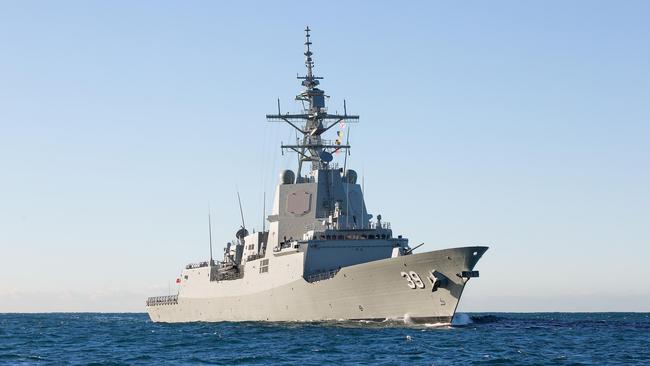
Above all, we need a coherent, urgent, dedicated missile strategy. We need relatively long-range ground-launched missiles. Hezbollah, a terrorist militia movement in southern Lebanon, has 100,000 missiles and is an existential threat to Israel. We are the 13th biggest economy in the world and we possess missile stocks in their dozens. This bears not the faintest resemblance to a war-fighting capability.
On all the ships and submarines we have we need longer-range and more lethal missiles. We need lots of deadly, armed drones. Currently we have no armed drones and just abolished the program in which we were going to acquire our first.
Similarly, Navantia’s proposal to build three new air warfare destroyers, here or in Spain or in any confabulated hybrid version necessary to satisfy the politics of Adelaide, is a very good idea and one the government should implement. The AWDs are not a perfect fighting vessel. I always thought we should get the US Arleigh Burke-class destroyers. But they are at least a modern warship with 48 missile launch cells. We have three of them in service. We know how they work, how to operate them.
The navy doesn’t like this idea because it thinks more AWDs could threaten the notional nine Hunter-class frigates we are scheduled to build sometime in the future, the first of which won’t enter service until the early or mid-2030s. The Hunter frigates are a troubled program, barely in better shape than the French subs were when they were cancelled. Some members of the previous government thought these frigates were an ineffective and excessively expensive way of getting the military capability they supposedly offer, but that cancelling them would be too big a blow to relations with the UK, especially after we’d done the same to France over submarines and earlier something similar to the Japanese.
But if the AWDs threaten the Hunter frigates, that’s great. They could do with the competition. The AWDs have the inestimable benefit that they would be a real capability we could get quickly.
To do all this will cost a lot of money. Smith and Houston must recommend the ruthless cancellation of useless programs so we can finance the ones we need. If we have not already signed a binding contract on tanks we should cancel the tank order. In fact we should do that anyway. We have not deployed a single tank in any capacity in any militarily contested area since the Vietnam War. They have no relevance to the maritime challenges ahead. Similarly, the government should cut by three-quarters or more the order for 450 heavy armour infantry fighting vehicles. They too aren’t relevant to the maritime challenges ahead.
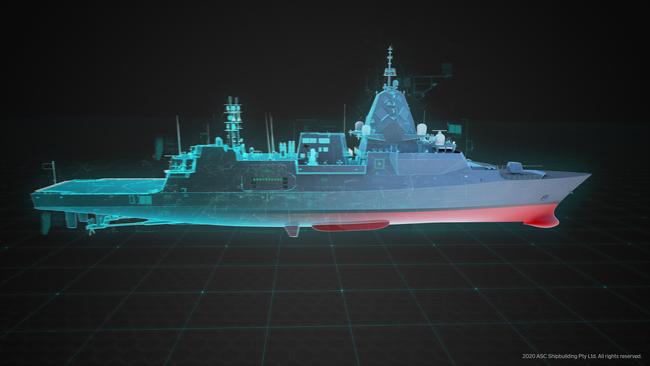
Smith and Houston must be ruthless in their recommendations or it will show that the government cannot really overcome Defence bureaucratic inertia. Obviously the money saved from those programs must be spent straight away on real capability acquisitions.
Two: Smith and Houston must make powerful recommendations for big muscle capabilities we get this decade or just after. Previous governments typically would spend 18 months or two years on a white paper that would claim, preposterously, to detail defence acquisitions out 25 or 30 years. They were only ever honoured in the breach. The government already deserves high marks for avoiding that syndrome.
The biggest question remains submarines. In one of the worst ongoing sagas of failure and incompetence in our history, successive governments since the Hawke era have done nothing of consequence to acquire a new submarine. It’s almost impossible to believe. We were fat, happy, lazy and incompetent. Governments killed off their predecessors’ submarine projects. Defence and the navy were allowed to endlessly add unique design requirements, and to make the mythical perfect is the enemy of the achievable good. Everyone involved in submarine policy over the past 30 years should hang their heads in shame.
Australia has failed in this way before. We entered World War II without submarines and effective fighter aircraft. With all that we knew, with all the experience of World War I behind us, in the face of the obvious threat from imperial Japan, we still could not manage to build or acquire submarines or modern fighters, the homegrown Wirraway aircraft being hopelessly inadequate in combat. We are on track to repeat this astounding national dereliction.
Whatever the submarine task-force reports, we are unlikely to get an actual nuclear-powered submarine into service before 2040. The Brits, with all their nuclear experience, struggled for years to bring the Astute-class boats into meaningful service.
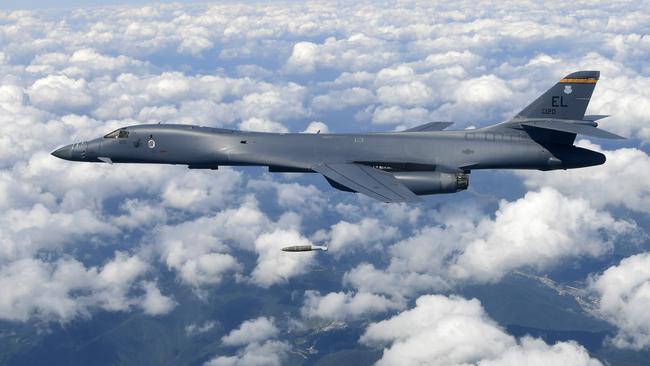
Even if we get a nuclear-powered sub a couple of years early, by the late 2030s, we won’t have our fleet of such subs until the 2050s. By then the strategic challenge of Beijing will be determined. The Christian Democrats might rule in Beijing or Canberra might administer a tributary state.
It’s obvious that we need an interim conventional submarine. Interim is a slightly misplaced word there, as a new sub would need to be in service until the 2050s. The navy says we can’t build that and build the nuclear-powered submarine. In truth, there are two perfectly good alternatives. Simply build more Collins-class subs, with all the updates and improvements that the scheduled life of type extension will provide. After all, the official line is that the LOTE Collins could well be in service until the 2040s and, though this is a bit of a joke, still regionally superior.
If that claim bears any relation to reality, then it would be much truer for new Collins with new hulls and every update imaginable. The other alternative is to buy Saab subs off the shelf. Don’t even integrate US weapons systems. Get them built in Sweden or wherever. They will have a slightly shorter range than the existing Collins boats. But in five years we may be dealing with Chinese military bases in the South Pacific. Range may not be so critical.
If we get an interim sub, we of course maintain our commitment to the AUKUS nuclear-powered subs. It would all be expensive and sub-optimal but our past failures have left us in this desperate strait. We would at least give ourselves a fighting chance of being able to do something meaningful in our own interests over the next 10 to 15 years.
The other alternative is to seek similar strategic effects through new aircraft such as the US B-21 strategic bomber. The great thing about emphasising the air force is that no one is foolish enough to insist we build new planes in Adelaide. So we can get actually get the US planes and they actually work.
Three: Smith and Houston must deliver a new defence force philosophy. This should centre on asymmetric defence, the same approach Beijing took to the US. We will always be a much smaller power than any nation that can threaten us. Therefore, instead of structuring the ADF to provide perfectly groomed niche supplements to US forces, we need a savage, lethal capability that raises unbearably the potential cost to any nation that would do us harm, and that we can also use to help the Americans.
Over to you, Stephen and Angus. No pressure.




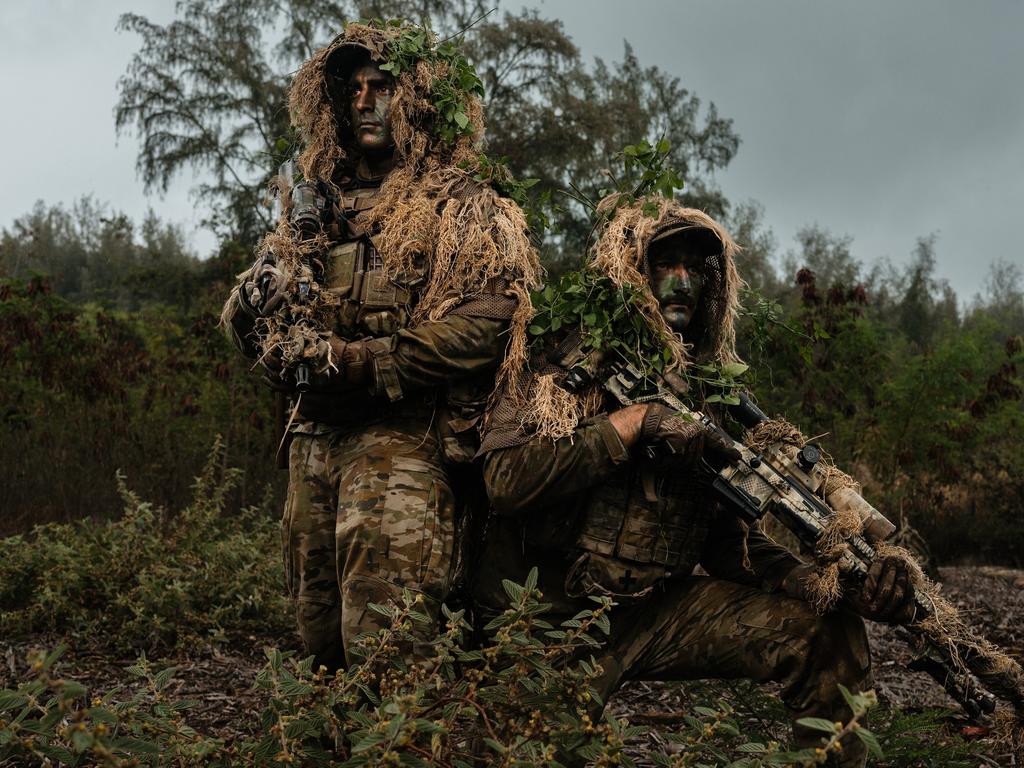
For the Albanese government, the rubber must hit the road in the next couple of weeks. No fair-minded observer can really begrudge Anthony Albanese having a picnic on the grounds provided by the mistakes and oddities of the Morrison government, from robo-debt to Scott Morrison’s magnificent multiplying secret ministries.